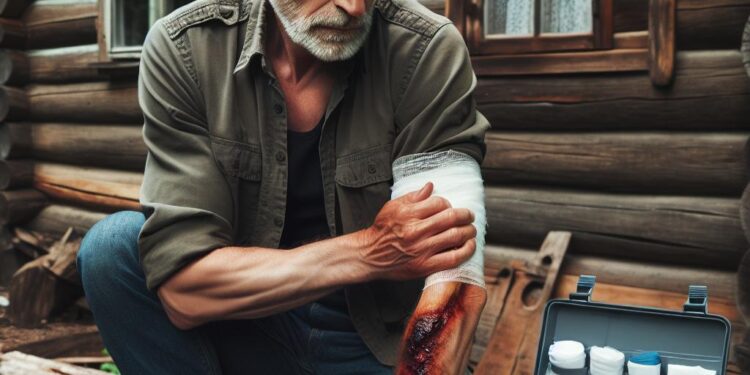When you’re out exploring the great outdoors or living off the grid, understanding how to treat wounds is critical. Injuries are unpredictable, but knowing the basics can be the difference between a quick recovery and a worsening problem. Often, folks overlook the importance of proper wound cleaning or delay treatment, thinking the wound is minor. That’s a common mistake. This blog is packed with practical tips and straightforward advice, breaking down wound care into manageable steps. It’ll boost your confidence in handling emergencies when you’re far from immediate medical help, ensuring you’re always ready for whatever nature throws your way.
What’s ‘How to Treat Wounds Off the Grid’?
When you’re off the grid, treating wounds isn’t just waving a magic wand but a crucial skill that fits snugly into survival or emergency prep. Imagine you’re in the wilderness, and a sharp rock decides to introduce your shin to a nasty cut. What do you do? First, keep calm—panicking never helps. Then, grab your trusty first aid kit, wash out the wound with clean water, disinfect it, and use clean cloth or bandages to cover it up. It’s not glamorous, but it’s necessary. This kind of practical knowledge is what separates a stress-filled hike punctuated by panic from a rewarding adventure. Knowing how to deal with wounds ensures that you’re prepared to handle real-life scenarios with a cool head. It’s like having a little safety net while embracing the rugged beauty around you, giving you peace of mind to focus on the thrill of outdoor living.The Importance of Treating Wounds Off Grid
For those looking to enhance their outdoor survival skills, understanding how to treat wounds when you’re off the grid offers several practical advantages. Here’s why you should make it a priority:-
– Enhanced Survival Readiness: Knowing how to properly treat wounds ensures you’re prepared for unexpected injuries, boosting your overall survival readiness.
– Improved Safety: Having the skills to manage wounds effectively reduces the risk of infections and other complications, keeping you safer in remote environments.
– Efficient Use of Gear: Familiarity with wound treatment helps you use first aid supplies more efficiently, ensuring they last longer when resources are scarce.
– Health in Emergencies: Proper wound care is crucial for maintaining your health during emergencies, allowing you to stay physically and mentally strong.
– Reduced Reliance on Modern Systems: By learning to treat wounds off the grid, you become less dependent on immediate access to professional medical facilities.
– Confidence Boost: Equipping yourself with wound treatment skills builds confidence in handling medical situations, which can be invaluable in a crisis.
– Team Safety: If you’re with others, your ability to manage injuries can enhance the safety of your entire group, ensuring everyone’s well-being is taken into account.
Using ‘Off-Grid Wound Care’ Every Day
Hey there, survivors! Feeling ready to face the wilderness with confidence? Let’s make sure you’ve got some essential skills up your sleeve, especially when it comes to treating wounds off the grid. Here’s how you can incorporate these tips into your daily life or survival prep plan:- Keep a well-stocked first aid kit in your backpack, car, or home. Ensure it includes antiseptics, bandages, and tweezers.
- Practise wound-cleaning techniques like flushing with clean water in urban settings using your kitchen sink.
- Incorporate regular skill drills such as improvising bandages using clean clothing when hiking on rural trails.
- Learn to recognise signs of infection to act promptly, whether wandering city streets or camping out in the wild.
- Get accustomed to using natural resources like plant leaves or sap for wound dressing when supplies run low.
DIY & Guided Tips for Off-Grid Wound Care
1. Stay Clean: Always have a small first-aid kit with antiseptic wipes. For hikers or campers, a clean wound heals faster.2. Stop the Bleeding: Apply pressure with a sterile bandage. Solo travelers should keep elastic bandages handy.
3. Dress the Wound: Use medical tape to secure a bandage. In remote areas, keep wound secure and dry until help arrives.
4. Consider Courses: If adventuring complete, a survival course may offer invaluable skills.
5. Upgrade Gear: Handy for long-term campers or extreme sport enthusiasts—invest in pro-grade first aid kits.
For campers, ensuring wounds are clean can prevent infections. Remote workers might need courses for better preparedness.
Quick Wound Care Tips for Remote Areas
Understanding the costs and time commitment involved in preparing for wound treatment off the grid is crucial for effective readiness.| Aspect | Cost | Time/Effort Required |
|---|---|---|
| Basic First Aid Kit | £15-£50 | Minimal, purchase and familiarisation required |
| Advanced First Aid Training | £100-£300 | 8-20 hours depending on course length |
| Long-term Medical Supplies | £50-£100 annually | Regular checks and replenishments |
| Knowledge Acquisition (Books/Online Resources) | Free-£20 | 5-10 hours of reading and practising |
| Setup and Organisation of Supplies | None | 1-3 hours initially, then as needed |




